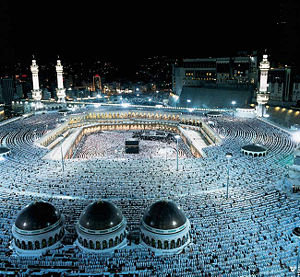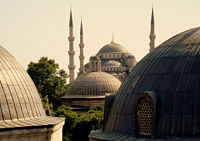Portal:Islam
2008/9 Schools Wikipedia Selection. Related subjects: Portals; Religion; Religious movements, traditions and organizations
|
Islam (Arabic: الإسلام al- islām) "the submission to God" is a monotheistic faith, one of the Abrahamic religions and the world's second largest religion. Followers of Islam, known as Muslims (from the Arabic word, muslimeen, meaning "those who submit to God's will"), believe that God (or, in Arabic, Allāh; also in Aramaic Alaha) revealed his direct word for mankind to the prophet Muhammad (c. 570– 632 CE). Revelation and Dawa started when he was at age 40. These revelations are recorded in the Injeel ( Gospel) [as revealed to Isa (Jesus)], the Zabur ( Psalms) and the Qur'an ("Recitation") which Muslims believe to be the final revelation from God to humanity. Muslims believe that Muhammad, is the last or the seal of the prophets and that his preachings for humankind will last until qiyamah ("The Day of Resurrection", also known as " The Day of Judgement"). Five Pillars of Islam (Arabic: أركان الإسلام) is the term given to the five duties incumbent on every Muslim. Shirk (Islam) is considered to be the Unpardonable Sin. A mosque is a place of worship for followers of the Islamic faith. Muslims all over the world often refer to the mosque by its name in Arabic, masjid (pl. masajid) (Arabic: مسجد — pronounced: /mas.ˈɡʲid/ or /mas.ˈʤid/). The Arabic word masjid means temple or place of worship and comes from the Arabic root sajada (root "s-j-d," meaning to bow or kneel) which means he worshipped in reference to the prostrations performed during Islamic prayers. The word mosque in English is used to represent all types of buildings dedicated for Islamic worship, although there is a distinction in Arabic between the smaller, privately-owned mosque and the larger, "collective" mosque (masjid jami) (Arabic: جامع), which has more community and social amenities. The primary purpose of the mosque is to serve as a place where Muslims can come together for prayer. Nevertheless, mosques are known around the world nowadays for their general importance to the Muslim community as well as their demonstration of Islamic architecture. They have evolved significantly from the open-air spaces that were the Quba Mosque and Masjid al-Nabawi in the seventh century. Today, most mosques have elaborate domes, minarets, and prayer halls. Mosques originated on the Arabian Peninsula, but now one can find mosques on all six inhabited continents where Muslim communities exist. For Muslims, they are not only places to worship and pray; they are also places to learn about Islam and meet other Muslims. On many occasions, places of worship of other faiths such as synagogues or churches were converted into mosques. 
The Masjid al-Haram in Mecca
Masjid al-Haram (المسجد الحرام "The Sacred Mosque"), is the oldest and largest mosque and religious building in the world. It is located in the city of Mecca. It surrounds the Ka'aba, the place which all Muslims turn towards each day in prayer and considered to be the holiest place in Islam. The mosque is also commonly known as the Haram or Haram ash-Sharif. The current structure covers an area of 356,800 square meters including the outdoor and indoor praying spaces and can accommodate up to 820,000 worshipers during the hajj period.
Al-Aqsa Mosque ("The Farthest Mosque") (Arabic: المسجد الاقصى, al-Masjid al-Aqsa}}), is a mosque located in what Arabs and Muslims refer to as al-Haram ash-Sharif ("the Noble Sanctuary"), although the whole area of the Noble Sanctuary is considered al-Aqsa Mosque according to Islamic law. It is known as the Temple Mount to Jews and Christians. It is located in the Old City of eastern Jerusalem, a disputed territory governed as part of Israel since its annexation in 1967 but claimed by the Palestinian National Authority as part of a future State of Palestine. The oldest mosque in Palestine, its congregation building can accommodate about 5,000 worshipers, while its precincts could accommodate 400,000. The Israeli government has granted an Islamic council, the Waqf, full administration of the mosque and has barred Jews from visiting the site. The historical significance of al-Aqsa Mosque is further emphasized by the fact that the Jews used to turn towards the Temple Mount when they prayed. As it was the place at which Muhammad performed the first commanded prayer after Isra and Mi'raj, it became the qibla (direction) that Muslims faced during prayer and continued to be so for sixteen or seventeen months. After a revelation was recorded in the Qur'an, the qibla was then turned towards Mecca. Originally, the Rashidun caliph Umar built a small prayer house on the site, but the Ummayad caliphs Abd al-Malik and al-Walid I built a larger mosque on the site in 705 CE. Nothing remains of the Ummayad mosque, and the present-day mosque dates back to the renovated version commissioned by the Fatimid caliph Ali az-Zahir in 1033 CE. The Crusaders, Mamluks and Ayyubids added a facade, porch, a mihrab and four minarets to al-Aqsa Mosque throughout the later centuries and the mosque's last major renovation took place in 1983 with the restoration of a lead-plated dome. Muhammad ibn ‘Abdullāh (ca. 570 Mecca – 8 June 632 Medina), is the central human figure of the religion of Islam and is regarded by Muslims as the messenger and prophet of God (Arabic: الله Allāh), the last and the greatest in a series of prophets of Islam. Muslims consider him the restorer of the uncorrupted original monotheistic faith ( islām) of Adam, Abraham, Moses, Noah and other prophets of Islam. He was also active as a diplomat, merchant, philosopher, orator, legislator, reformer, military general, and, for Muslims and followers of several other religions, an agent of divine action. Born in 570 CE in the Arabian city of Mecca, he was orphaned at a young age and was brought up under the care of his uncle. He later worked mostly as a merchant, and was first married by age 26. Discontented with life in Mecca, he retreated to a cave in the surrounding mountains for meditation and reflection. According to Islamic beliefs it was here, at age 40, in the month of Ramadan, where he received his first revelation from God. Three years after this event Muhammad started preaching these revelations publicly, proclaiming that " God is One", that complete "surrender" to Him (lit. islām) is the only way ( dīn) acceptable to God, and that he himself was a prophet and messenger of God, in the same vein as Adam, Noah, Abraham, Moses, David, Jesus and other prophets in Islam. Muhammad gained few followers early on, and was met with hostility from some tribes of Mecca; he was treated harshly and so were his followers. To escape persecution Muhammad and his followers migrated to Medina (then known as Yathrib) in the year 622. This event, the Hijra, marks the beginning of the Islamic calendar. In Medina Muhammad managed to unite the conflicting tribes, and after eight years of fighting with the Meccan tribes, his followers, who by then had grown to ten thousand, conquered Mecca. In 632 a few months after returning to Medina from his Farewell pilgrimage, Muhammad fell ill and died. By the time of his death most of the Arabian Peninsula had converted to Islam and he united the tribes of Arabia into a singular Muslim religious polity. The revelations (or Ayats, lit. "Signs of God"), which Muhammad reported receiving until his death, form the verses of the Qur'an, regarded by Muslims as the “word of God”, around which his religion is based. Besides the Qur'an, Muhammad’s life ( sira) and traditions ( sunnah) are also upheld by Muslims. They discuss Muhammad and other prophets of Islam with reverence, adding the phrase peace be upon him whenever their names are mentioned.
|


